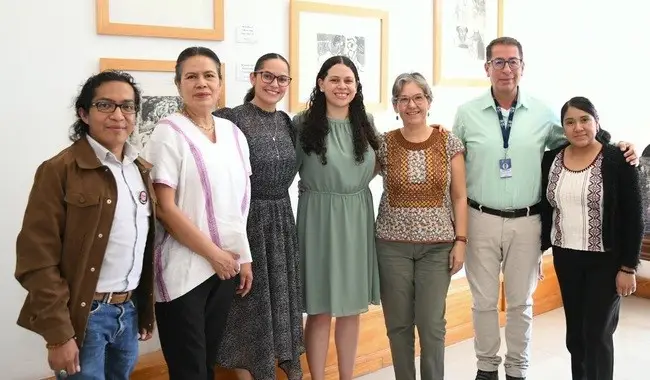The government of the state of Tlaxcala, through the Ministry of Culture, in coordination with the Ministry of Culture of the Government of Mexico, through the National Institute of Indigenous Languages (INALI), held a working meeting in which the project “Revitalization and Transmission Mechanisms of Indigenous Languages in Tlaxcala” was presented. This effort seeks to strengthen the preservation and use of indigenous languages in the state, with strategies focused on the documentation of oral histories, the development of bilingual educational materials, and the promotion of their teaching in community and academic settings.
Present at the session, chaired by Karen Villeda, the Secretary of Culture of the state of Tlaxcala, were Alma Rosa Espíndola Galicia, Head of the Office of the General Director of INALI; Rosa Almandina Cárdenas Demay, General Coordinator of Language Policies; and Iván León Javier, head of the National Indigenous Languages Institutionalization Unit; Angélica Lujano García, Coordinator of Institutional Linguistic Planning; as well as the Secretary of Welfare of Tlaxcala, María Estela Álvarez Corona; and anthropologist Juan Carlos Ramos Mora, Director of Cultural Outreach at the Tlaxcala Ministry of Culture.
The meeting highlighted that, according to data from INEGI (2020), there are more than 27,000 indigenous language speakers in Tlaxcala, with Nahuatl predominating, followed by Totonac, Otomi (Yuhmu), Mazatec, Zapotec, and Mixtec. However, some of these languages are facing a decline in intergenerational transmission, making it urgent to implement strategies to promote their teaching and revitalization in different settings.
The presented project includes the collection and transcription of oral histories from native speakers, the production of teaching materials in indigenous languages and Spanish, the delivery of community workshops, and the creation of spaces for dialogue and learning to strengthen their everyday use. It also seeks to forge partnerships with academic and cultural institutions that contribute to teacher training and the professionalization of interpreters in indigenous languages.
To learn more about Mexico’s linguistic and cultural diversity, visit the INALI website (inali.gob.mx) as well as social media on Facebook, Instagram, and YouTube (INALI México), on X (@INALIMEXICO), and on TikTok (Inali_mexico).

Source: gob




